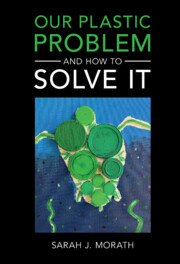Book contents
- Our Plastic Problem and How to Solve It
- Our Plastic Problem and How to Solve It
- Copyright page
- Contents
- Acknowledgments
- Abbreviations
- Introduction
- Part I Plastic in the Environment
- 1 The Proliferation of Plastic
- 2 Measuring Plastic
- 3 Plastic as a Pollutant
- Part II Multimodal Approaches to Solving Our Plastic Problem
- Part III Innovation and Design
- Index
3 - Plastic as a Pollutant
A Revolutionary Material Becomes a Global Threat
from Part I - Plastic in the Environment
Published online by Cambridge University Press: 17 March 2022
- Our Plastic Problem and How to Solve It
- Our Plastic Problem and How to Solve It
- Copyright page
- Contents
- Acknowledgments
- Abbreviations
- Introduction
- Part I Plastic in the Environment
- 1 The Proliferation of Plastic
- 2 Measuring Plastic
- 3 Plastic as a Pollutant
- Part II Multimodal Approaches to Solving Our Plastic Problem
- Part III Innovation and Design
- Index
Summary
Plastic’s aesthetic harm – to beaches, waterways, and roadsides, for example – is apparent. Less apparent – and less studied – is the harm that results from plastic’s persistence in our environment. Because plastic has been mass-produced only for the last sixty years or so, its longevity in the environment is somewhat speculative. There is agreement that plastic has the potential to persist for a very long time in the environment. One study found, for example, that PET-plastic bottles, while recyclable, would take 400 years to naturally decompose. Most plastics, however, are not biodegradable, and one study estimates that 60 percent of the 8,300 million metric tons of virgin plastics that have been produced to date are on the planet somewhere.
Coastal area residents feel like they are drowning in plastic, while marine life is drowning in plastic. Nearly 90% of floating marine litter is plastic – polyethylene and polypropylene, Styrofoam, nylon, and saran. Birds, fish, and mammals can become entangled in and choke on plastic debris. As plastics slowly break down, smaller toxic pieces leach into the soil, water, and air. These tiny pieces of plastic harm aquatic ecosystems, damage coral reefs, and contaminate water. When consumed by fish and animals, microplastics can enter the human food chain. One study found that swallowing 14 pieces of plastic significantly increases the risk of death in turtles, while another found that by the year 2050, 99% of all seabirds will have ingested plastic. Humans are not immune to plastic’s touch. Microplastics have been found in table salt and human stools. More recently, plastic has been tied to climate change. A 2019 study published in Nature Climate Change found that if plastic production continues at its current rate, the greenhouse gas emissions from plastics would reach 15% of the total carbon emissions by 2050.
Keywords
- Type
- Chapter
- Information
- Our Plastic Problem and How to Solve It , pp. 36 - 52Publisher: Cambridge University PressPrint publication year: 2022



